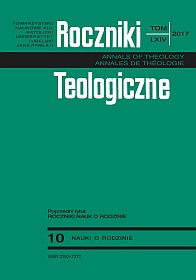Family in Africa – (Not) a Safe Haven from Human Trafficking
Abstrakt
Rodzina w Afryce − (nie)bezpieczne schronienie przed handlem ludźmi
Instytucja rodziny nie zawsze jest miejscem, w którym ofiara handlu ludźmi otrzyma pomoc, schronienie i wsparcie. Zmiany cywilizacyjne spowodowały, że instytucja rodziny w Afryce (zwłaszcza w Afryce Wschodniej) często przyczynia się do sprzedaży jej członków. Autor przytacza przykłady najczęstszych aktów sprzedania ofiar do pracy niewolniczej przy aktywnym udziale rodziny w Afryce Wschodniej.
Bibliografia
Bales, Kevin. Understanding Global Slavery. Berkeley—Los Angeles, 2005.
Chuang, Janie. “Giving as Governance? Philanthrocapitalism and Modern-Day Slavery Abolition.” UCLA Law Review 62(6)(2015): 1516-1556.
Gallagher, Arthur. The Global Slavery Index is Based on Flawed Data – Why does no one Say so?. Retrieved on June 11, 2016, <http://www.theguardian.com/globaldevelopment/poverty-matters/2014/nov/28/global-slavery-index-walk-free-humantrafficking-anne-gallagher>
Haart Kenya. “The Promise.” Retrieved on January 10, 2017, https://www.youtube.com/watch?v=A6ovgENrEXs
International Labour Organisation. “C189—Domestic Workers Convention, 2011.” Retrieved on January 10, 2017, http://www.ilo.org/dyn/normlex/en/f?p=NO RMLEXPUB:12100: 0::NO::p12100_instrument_id:2551460
International Labour Organisation. “Decent Work for Domestic Workers.” Retrieved on January 9, 2017, http://www.ilo.org/wcmsp5/groups/public/---africa/---ro-addis_ababa/---ilo-dar_es_salaam/documents/publication/wcms_316267.pdf
International Labour Organization. “Global Estimate of Forced Labour.” Retrieved on June 15, 2016, <http://www.ilo.org/wcmsp5/groups/public/ed_norm/declaration/documents/publication/wcms_181921.pdf>
Odera, Tonny & Radoslaw Malinowski. Guidelines for Assiting Victimsof Human Traficking in Eastern Africa Region (2011). Retrieved on January 12, 2017, http://publications.iom.int/system/files/pdf/guidelinesforassistingvictims_en_a5.pdf
Oheneba-Sakyi, Yaw & Baffour K. Takyi. African Families at the Turn of the 21st Century, Westport, London: Kendall Hunt Publishing 2008.
Protocol to the African Charter on Human and Peoples' Rights on the Rights of Women in Africa. Retrieved on January 9, 2017, http://www.achpr.org/files/instruments/women-protocol/achpr_instr_proto_women_eng.pdf
Rodney, Walter. How Europe Underdeveloped Africa. Oxford, Nairobi 2012.
UN General Assembly, “Protocol to Prevent, Suppress and Punish Trafficking in Persons, Especially Women and Children, Supplementing the United Nations Convention against Transnational Organized Crime.” Retrieved on June 13, 2016, http://www.refworld.org/docid/4720706c0.html
UNICEF. “Child Marriage.” Retrieved on January 10, 2017, https://www.unicef.org/protection/57929_58008.html
United Nations Development Program. “Human Development Indicators.” Retrieved on January 12, 2017, http://hdr.undp.org/en/countries/profiles/KEN
United Nations Office on Drugs and Crime. “Global Report on Trafficking in Persons 2012,” Retrieved on June 20, 2016, https://www.unodc.org/documents/data-andanalysis/glotip/Trafficking_in_Persons_2012_web.pdf
Yankuzo, Kabiru I. “Impact of Globalization on the Traditional African Cultures” International Letters of Social and Humanistic Sciences 15(2013): 1-8.
Copyright (c) 2017 Roczniki Teologiczne

Utwór dostępny jest na licencji Creative Commons Uznanie autorstwa – Użycie niekomercyjne – Bez utworów zależnych 4.0 Międzynarodowe.





